Interview Feedback Letter
Dear [Recipient's Name],
Subject: Interview Feedback
I hope this letter finds you well. I would like to express my sincere gratitude for the opportunity to interview for the [Position] role at [Company/Organization Name]. I greatly appreciate the time and effort you and the interview panel dedicated to meeting with me and considering my qualifications.
I wanted to take this opportunity to provide you with some feedback about the interview process. I believe that constructive feedback can help both candidates and organizations improve and enhance their hiring processes.
First and foremost, I would like to commend your organization for the professionalism and courtesy displayed throughout the entire interview process. From the initial contact to the final interview, every interaction was conducted in a highly respectful and engaging manner. It was evident that your team values open communication and creating a positive candidate experience.
I found the interview process to be thorough and well-structured. The questions posed by the interview panel were thought-provoking and allowed me to showcase my skills and experiences effectively. The panel members demonstrated a deep understanding of the role and the qualifications required, which made the interview feel meaningful and relevant.
Furthermore, I was impressed by the depth of knowledge and expertise possessed by the interview panel. The insights shared during the interview shed light on the organization's values, goals, and challenges. It was clear to me that [Company/Organization Name] is a dynamic and innovative company, and I appreciate the opportunity to learn more about its mission and vision.
While I was excited about the role and believe it aligns well with my skills and aspirations, I also recognize that there may be other candidates who are better suited for the position. If, after careful consideration, you decide to pursue other candidates, I would be grateful for any specific feedback you could provide regarding areas where I can further develop and improve my qualifications. This feedback would be invaluable as I continue to grow and seek new opportunities.
Once again, I would like to express my appreciation for the chance to interview with [Company/Organization Name]. I am genuinely interested in the work your organization is doing and would welcome any future opportunities to contribute to its success.
Please do not hesitate to reach out if there are any additional materials or references I can provide to support my application. Thank you for your time and consideration.
Wishing you and your team continued success.
Sincerely,
[Your Name]
Positive Interview Feedback Letter
Dear [Candidate Name],
Thank you for attending the interview for the [Job Title] position at [Company Name]. We were impressed with your qualifications, experience, and the enthusiasm you displayed during our discussion.
Your skills in [specific skills] align well with our team’s needs, and we would like to move forward with your application. Our HR team will be in touch shortly to discuss the next steps.
Congratulations and we look forward to welcoming you to our team.
Sincerely,
[Your Name]
[Position]
[Company Name]
Constructive Interview Feedback Letter
Dear [Candidate Name],
Thank you for participating in the interview for the [Job Title] position at [Company Name]. While your background and skills are impressive, we have identified areas where further development could strengthen your candidacy.
Specifically, we suggest focusing on [specific skill or area], which would better align with the requirements of this role. We encourage you to continue refining your skills and welcome you to apply again in the future.
Thank you for your time and interest in [Company Name].
Best regards,
[Your Name]
[Position]
[Company Name]
Quick Interview Feedback Email
Hi [Candidate Name],
Thank you for interviewing with us for the [Job Title] position. We appreciate your time and interest. While we were impressed with your experience, we have chosen to move forward with another candidate at this time.
We encourage you to apply for future openings.
Best regards,
[Your Name]
Heartfelt Interview Feedback Letter
Dear [Candidate Name],
We sincerely appreciate the effort you put into your interview for the [Job Title] role. Your passion, dedication, and enthusiasm were truly evident.
Although we have selected another candidate for this position, we encourage you to continue pursuing opportunities in this field. Your potential is clear, and we hope our paths cross again.
Warm regards,
[Your Name]
[Company Name]
Detailed Performance-Based Interview Feedback Letter
Dear [Candidate Name],
Thank you for interviewing with [Company Name] for the [Job Title] role. We were impressed with several aspects of your performance:
- Strong communication and presentation skills
- Relevant experience in [specific area]
- Enthusiasm for the position
Areas for improvement include:
- [Specific skill or knowledge area]
- [Additional constructive point]
We appreciate your interest in [Company Name] and hope to see you in future opportunities.
Sincerely,
[Your Name]
[Position]
[Company Name]
Informal Interview Feedback Message
Hello [Candidate Name],
Thanks for taking the time to interview with us. We enjoyed learning more about your background and experience. While we are moving forward with another candidate, we appreciate your interest and hope you will stay in touch.
All the best,
[Your Name]
What an Interview Feedback Letter Is and Why You Need It
An Interview Feedback Letter is a formal or informal document provided to a job candidate after an interview.
Purpose:
- Communicate the outcome of the interview
- Provide constructive feedback to help candidates improve
- Maintain a professional relationship and positive employer branding
- Ensure transparency and respect for the candidate’s efforts
Who Should Send an Interview Feedback Letter
- Hiring managers or team leads who conducted the interview
- HR personnel responsible for recruitment communication
- Any authorized representative of the organization managing candidate interactions
Whom the Letter Should Be Addressed To
- The candidate who attended the interview
- External applicants or internal employees seeking promotion
- Candidates from all levels relevant to the position interviewed
When to Send an Interview Feedback Letter
- Within 1–2 weeks after the interview
- After final decision-making on candidate selection
- As soon as possible to maintain professional courtesy and candidate engagement
How to Write and Send an Interview Feedback Letter
- Review the candidate's interview notes and performance
- Decide on the tone: positive, constructive, or neutral
- Be specific about strengths and areas for improvement
- Maintain professionalism and empathy
- Send via email or postal service based on the organization’s practice
Elements and Structure of an Interview Feedback Letter
- Salutation addressing the candidate
- Opening paragraph acknowledging the interview and expressing appreciation
- Body paragraphs with:
- Strengths observed
- Areas for improvement (if applicable)
- Decision or next steps
- Closing paragraph thanking the candidate
- Signature and contact information
Formatting Guidelines for Interview Feedback Letters
- Length: 1 page maximum, or concise if emailed
- Tone: professional, respectful, and clear
- Wording: specific, constructive, and empathetic
- Style: structured with introduction, body, and conclusion
- Mode: email is standard; printed letters can be used for formal scenarios
Requirements and Prerequisites Before Writing
- Detailed notes from the interview
- Evaluation criteria or scoring sheets
- Agreement on the decision regarding candidate selection
- HR guidelines for feedback content and tone
Common Mistakes to Avoid
- Being vague or overly generic
- Using negative or harsh language
- Providing inaccurate or unverified feedback
- Delaying communication unnecessarily
- Ignoring company policies on feedback
Tips and Best Practices
- Personalize feedback to the individual candidate
- Keep the message clear and structured
- Highlight strengths as well as areas for improvement
- Use positive language even when giving rejection feedback
- Ensure timely delivery to maintain candidate goodwill
Frequently Asked Questions About Interview Feedback Letters
Q: Is it mandatory to provide feedback to all candidates?
A: Not legally, but providing feedback improves employer reputation.
Q: Can feedback be both positive and constructive in one letter?
A: Yes, it is best to acknowledge strengths while suggesting areas for growth.
Q: Should rejection letters include reasons for not selecting a candidate?
A: Yes, but keep it general and professional, focusing on skills or fit rather than personal critique.
Q: Can feedback be sent via email?
A: Yes, email is the most common and timely method.
After Sending an Interview Feedback Letter
- Document the communication for HR records
- Be prepared to answer follow-up questions from the candidate
- Use feedback to improve interview and evaluation processes
- Encourage the candidate to apply for future positions if appropriate
Pros and Cons of Sending Interview Feedback Letters
Pros:
- Enhances company reputation and candidate experience
- Provides learning opportunities for candidates
- Builds a professional relationship for future applications
Cons:
- Time-consuming if many candidates are interviewed
- Risk of misinterpretation or legal concerns if feedback is not carefully phrased
- May require review and approval by HR or legal teams
Compare and Contrast with Other Communication Methods
- Compared to phone calls: letters provide a permanent record
- Compared to generic rejection emails: personalized letters are more professional and constructive
- Alternative: online feedback forms, which may be less personal but efficient for volume

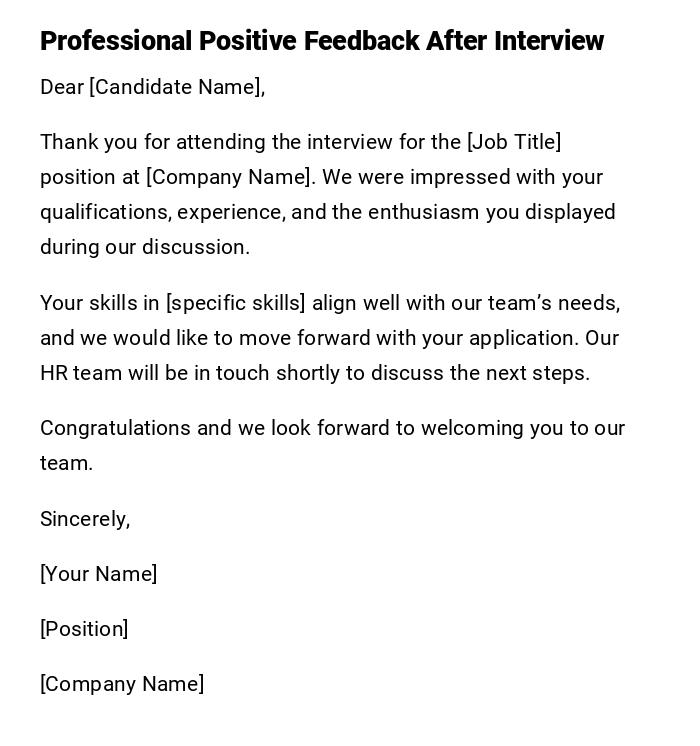
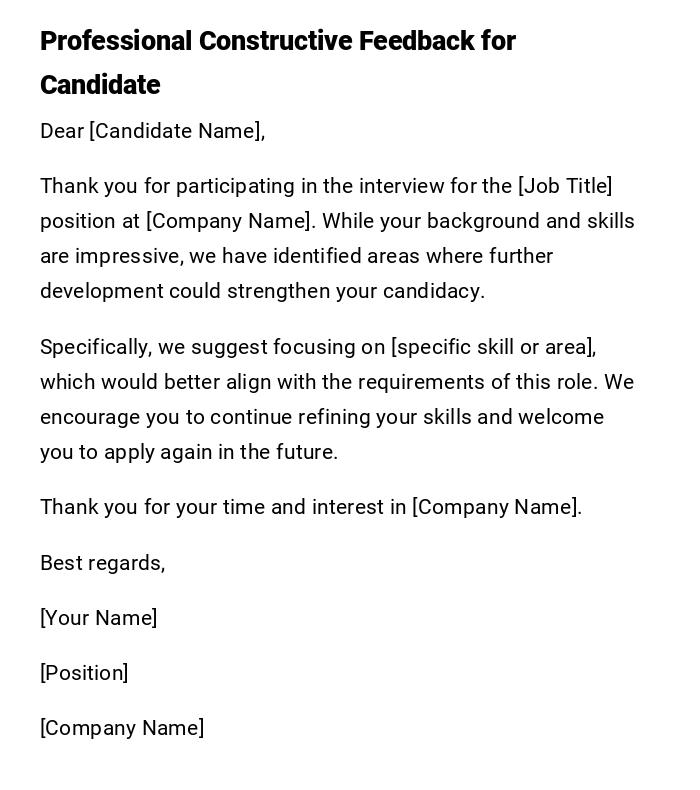
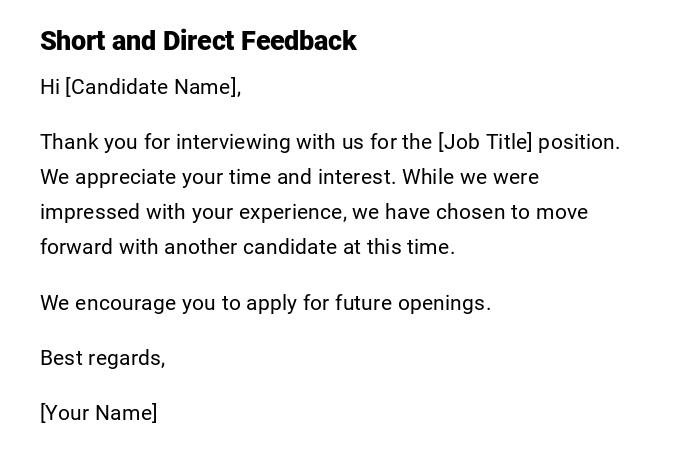
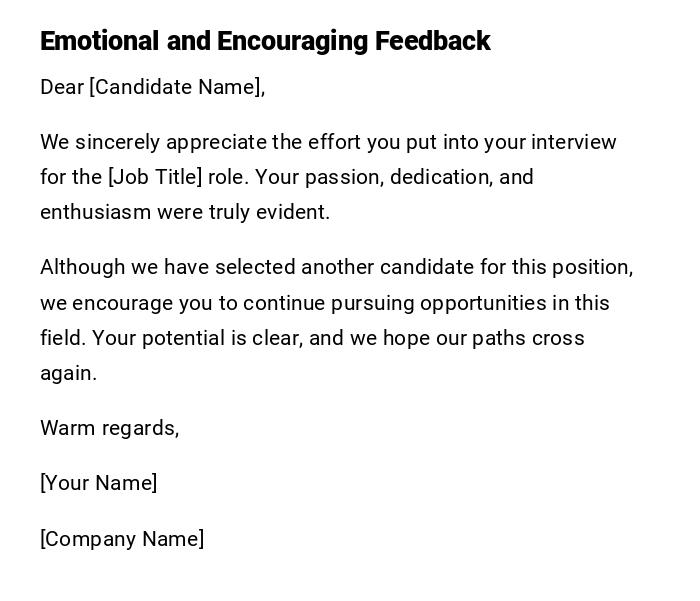
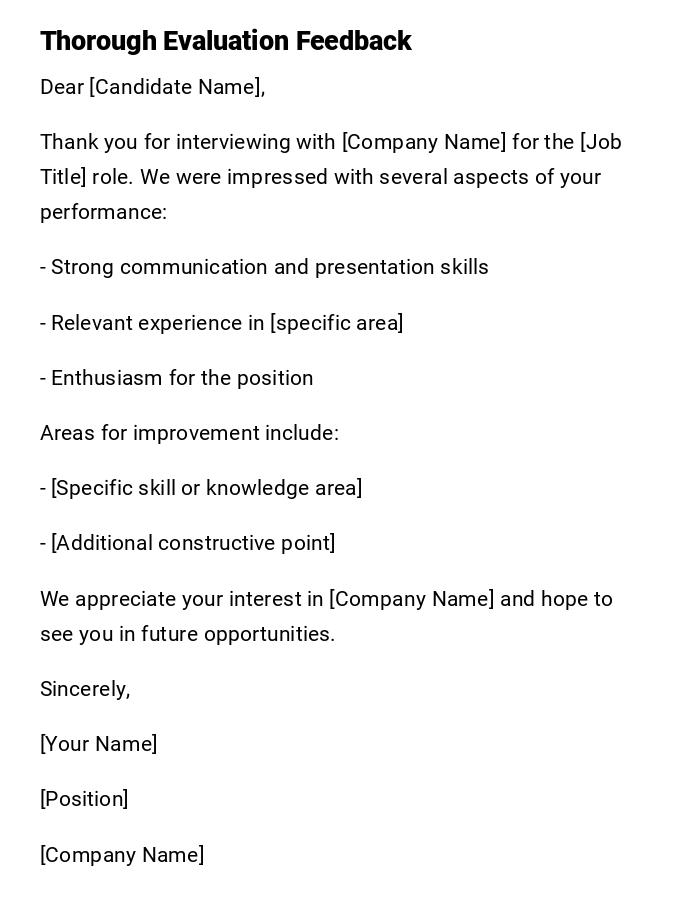
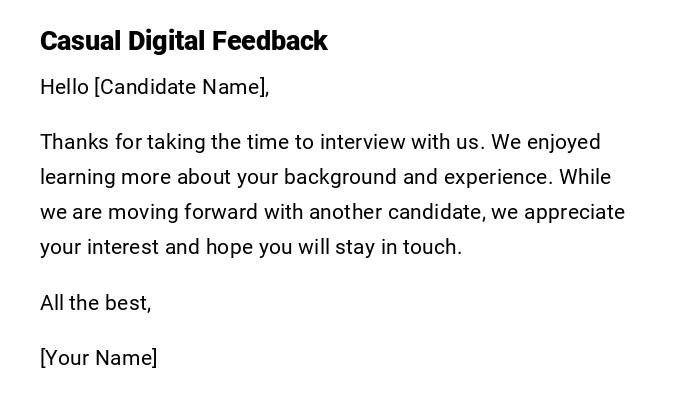

 Download Word Doc
Download Word Doc
 Download PDF
Download PDF